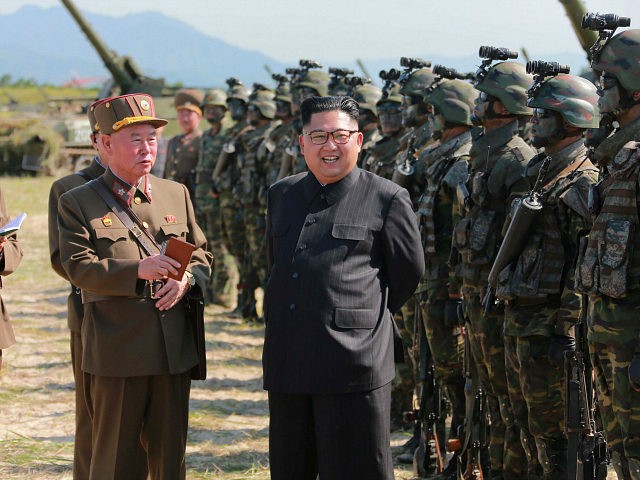China’s state-run Global Times posted a furious editorial on Sunday denouncing the Trump administration for canceling a planned trip to North Korea by Secretary of State Mike Pompeo.
The Chinese paper was especially angry at President Donald Trump for saying that China is not “helping with the process of denuclearization as they once were” because of its trade dispute with the United States.
“Obviously, the U.S. is shifting the blame to others,” the Global Times wrote. “Washington should bear the main responsibility for the stalemate in talks with North Korea.”
In the Global Times’ telling, North Korea has made all sorts of sincere overtures, but the Trump administration stubbornly refuses to reward it:
After the summit between Trump and North Korean leader Kim Jong-un in June, Pyongyang showed sincerity by demolishing its Punggye-ri nuclear test site, dismantling missile facilities and returning the remains of US soldiers killed during the Korean War. However, Washington did not make corresponding moves but kept threatening Pyongyang with unilateral sanctions.
It seems that the White House has found a good excuse. By linking denuclearization of the Korean Peninsula with China’s firm countermeasures against the trade war, the White House can not only ease the skepticism within the US about the outcome of the Trump-Kim summit, but also counter the rising criticism of its trade policy. Nonetheless, this reveals that the White House has no sincerity on the issue of denuclearization.
There should be a timetable for denuclearization, but the pace of the schedule should not be controlled by a willful US. Washington must take into account the security demand of Pyongyang.
The Global Times editors later undermined their own case by suggesting Trump could win more Chinese cooperation with North Korea by taking a lighter touch with Beijing:
China is willing to continue to play this role and lay the foundation for denuclearization. But Washington should realize that it is impossible for China to do what it used to when the US acts peremptorily against China on trade issues.
While Beijing was willing to support tough sanctions after North Korea got out of control, it was inevitable that China would clamor for sanctions relief long before the United States and its allies felt their denuclearization goals had been accomplished.
Contrary to China’s portrayal of North Korea as making futile gestures to win relief from the intractable United States, senior vice president Sean King of Park Strategies lamented to CNBC on Monday that too much has been given away to North Korea already.
“We are worse off than where we were when the summit happened because, in the meantime, China and Russia have alleviated sanctions pressure on North Korea. We’ve also unilaterally canceled our military exercises with South Korea with our own president even labeling these exercises provocative which certainly unnerved Japan,” King argued.
“Trump thinks he (Kim) said he will give up his nukes and then we will work toward some kind of peace deal. But in Kim’s mind, it is the end of the U.S.-South Korea alliance first and then maybe he will denuclearize,” King added.
The Wall Street Journal proposed on Monday that Pompeo’s canceled trip to North Korea represents a gut check for South Korea, where liberal President Moon Jae-in campaigned on improved relations with the North.
Moon may have moved too quickly on diplomatic and economic concessions, leaving him in a tough spot when North Korea’s “charm offensive” fizzled out. South Korea’s plans to establish a liaison office in the border city of Kaesong might have been a step too far, as it would constitute the type of joint venture forbidden under U.S. sanctions.
“South Korea has been perceived as trying to convince Washington of North Korea’s cause, instead of the other way around,” as professor Kim Hyun-wook of Korea National Diplomatic Academy put it.
Go Myong-hyun, a research fellow at the Asan Institute for Policy Studies, saw Pompeo’s canceled trip as a disturbing sign that North Korea might have established the wedge between South Korea and the United States it wanted.
“I believe it’s pretty clear Mr. Moon is intent on pursuing inter-Korean engagement separately from the U.S.-North Korea denuclearization talks,” he said.

COMMENTS
Please let us know if you're having issues with commenting.